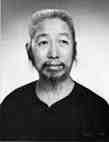
The I Ching or Book of Changes (Yijing) is one of China's most ancient books. It has served for over two thousand years as a source of inspiration for China and other cultures. It has been used in statecraft, philosophy, literature, history, fortunetelling, and as a book of wisdom. As part of the Confucian canon, the I Ching was memorized by youngsters as they prepared for the civil service exams.
Though the I Ching could be very cryptic, it was brought alive through the numerous interpreters and commentators, and came to form part of the foundation for all of Chinese culture. For scholars, it was typical to ponder the book for decades, and then, late in life, pen a commentary.
Cheng Man-ch'ing followed in this tradition. In the Taipei study that he called "Thatched Hut of No Regrets" (named for a line in the I Ching) Cheng wrote his last scholarly work, a commentary that drew from the writings of Lai Chih-te (來知德,Lai Zhide), a Ming dynasty scholar. Lai, whose book I-ching Lai chu t'u-chieh (易經來註圖解, Yijing Lai zhu tujie) has been in continuous print for over four hundred years, sought to break away from what had become orthodox teachings of the neo-Confucianists.
Cheng Man-ch'ing on the I Ching:
• I Ch'uan (易全,Yiquan, The Complete I). Selections translated in Cheng Man-ch'ing: Master of Five Excellences, pp.133–145 (tr. Mark Hennessy); and Cheng Man-ch'ing's Advanced T'ai-Chi Form Instructions: With Selected Writings on Meditation, the I Ching, Medicine, and the Arts, pp. 126–129 (tr. Douglas Wile).
Some books on the I Ching:
• The I Ching Richard Wilhelm (classic English translation, utilizes Song dynasty commentaries)
• The Zhouyi by Richard Rutt (translation built on earliest layer of text, analytical notes, historical and literary study)
• Fathoming the Cosmos and Ordering the World: The Yijing (I-Ching, or Classic of Changes) and its Evolution in China by Richard J. Smith (historical study) 2008
• Fortune-tellers & Philosophers: Divination in Traditional Chinese Society by Richard J. Smith (historical study)
Wednesday, February 20, 2008
The I Ching--The Book of Changes
at
7:32 AM
![]()
Labels: book of changes, books, cheng man-ch'ing, i ching, yijing, zheng manqing
Subscribe to:
Posts (Atom)
